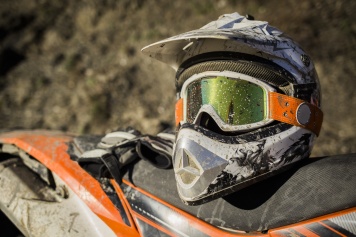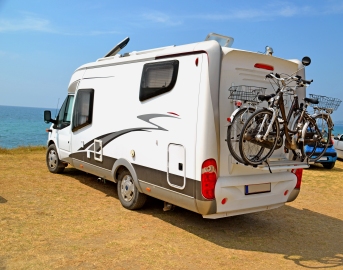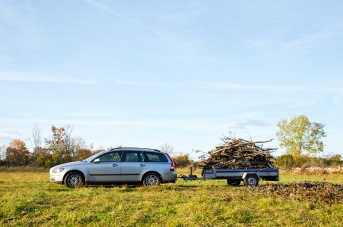It’s easy to tell why so many people are interested in taking the leap and purchasing an RV. An RV lets you spend time traveling and exploring new areas. Many people are even moving from traditional homes to RVs. Aside from reduced expenses, RVs can eliminate yard or lawn maintenance, there is much less home cleaning, and if you don’t like your neighbors, you can instantly move.
While an RV has a lot of perks and advantages, like making any major purchase, the RV buying process isn’t exactly fun and requires a lot of time and careful consideration. Here are some things you definitely want to keep an eye out for when scoping out a potential RV:
Bedrooms
Most RVs come without a separate bedroom; there are some that come with one or even two bedrooms. If you need more room, sleeper sofas are very useful and help you save money since they can be used as both seating and a sleeping area.
An Enclosed Bathroom
Although it sounds like a given, it’s not. Double check that the toilet has a door and the door isn’t see-thru glasses. Also, check that the bathroom isn’t only accessible through the bedroom as this can be inconvenient, especially if you plan on having guests stay in the RV.
Heating and Cooling
You want to stay comfortable when it’s hot or cold. Check the type of heating and cooling system the RV comes with and how it works.
Washer and Dryer
The necessity of a washer and dryer will depend on what you plan to use the RV for. If you see yourself using it for camping or road trips, most campgrounds have laundry facilities, and you can always find one during a road trip. However, if you plan to make your RV your new home, it’s probably best to invest in a washer and dryer set for convenience. Be mindful that not only can these be expensive, but they can take up a fair amount of room in your RV.
Water Heater
No one likes a freezing cold shower. Most shower-equipped RVs come with a water heater, but check the capacity. If you can’t upgrade the heater, you can always buy a water heater separately and install it.
Awnings
These are placed over the main entrance or large windows to protect you from the elements when sitting outside of your RV. They provide a great shade and keep the sun from beating on you during the summer and in warmer climates where RV travel is popular.
Leveling System
When shopping for an RV, pay attention to the jiggle and sway as you walk through it. Properly leveling and stabilizing your RV will add to your comfort, and ensure that all inside items work properly and stay in place. RV jacks are commonly used to stabilize and level the RV. Ask the salesperson to explain the leveling and stabilizing system that comes with the RV and any additions that may be available.
Hitch
If you have a car and want to tow it behind your motorhome, check to see if the RV comes with a hitch.
Test All Appliances
Make sure everything inside the RV works. This includes ovens, fridges, and heating and cooling units. These can all be expensive and buying replacements after spending on a new RV can be a downer.
Go for a Practice Drive
You want to feel comfortable and confident driving the RV, so it’s recommended to take it for a practice drive. This will help you get an idea of what it feels like driving it, how much space is needed for turns, and how hard it will be to switch lanes.
 If you love adventure, it’s likely that you own a trailer. Whether you use it to tow a boat, an ATV, a golf cart, a motorcycle, a waverunner or any other fun piece of equipment, you should make sure it is properly stored when not in use. Here are some important tips for storing your trailer when not using it so that it does not rust, have parts broken, or gets stolen.
If you love adventure, it’s likely that you own a trailer. Whether you use it to tow a boat, an ATV, a golf cart, a motorcycle, a waverunner or any other fun piece of equipment, you should make sure it is properly stored when not in use. Here are some important tips for storing your trailer when not using it so that it does not rust, have parts broken, or gets stolen.
 Do you own an ATV? If so, you’ll likely want to protect your investment as much as possible. As with owning a car, routine maintenance is very important for an ATV. It’s not hard to extend the life of your ATV — you just need to know what maintenance should be performed on a regular basis. Today, we will provide you with a handful of tips that will help your ATV improve performance and last longer.
Do you own an ATV? If so, you’ll likely want to protect your investment as much as possible. As with owning a car, routine maintenance is very important for an ATV. It’s not hard to extend the life of your ATV — you just need to know what maintenance should be performed on a regular basis. Today, we will provide you with a handful of tips that will help your ATV improve performance and last longer.
 The opportunity to get out on the water isn’t always an easy one to come by. You need to set aside time so you’ll have at least a full day that’s free of other responsibilities. Logistically, you need to worry about getting your boat both to and from the water and that means safely towing it to the launch ramp. The payoff, of course, is when you’re free to explore the open waters with family and friends aboard. To get to this point, you’ll need to research the best
The opportunity to get out on the water isn’t always an easy one to come by. You need to set aside time so you’ll have at least a full day that’s free of other responsibilities. Logistically, you need to worry about getting your boat both to and from the water and that means safely towing it to the launch ramp. The payoff, of course, is when you’re free to explore the open waters with family and friends aboard. To get to this point, you’ll need to research the best  – On any Sunday: How many motorcycles will you need to cart around from Point A to Point B? If the answer is one, then a single-rail type should suffice. The drawback here, and for other open-air trailers used for multiple bikes, is that they are subject to the elements. Enclosed trailers for more than one motorcycle often come with amenities you’d find inside a home. Of course, cost goes up with size and convenience.
– On any Sunday: How many motorcycles will you need to cart around from Point A to Point B? If the answer is one, then a single-rail type should suffice. The drawback here, and for other open-air trailers used for multiple bikes, is that they are subject to the elements. Enclosed trailers for more than one motorcycle often come with amenities you’d find inside a home. Of course, cost goes up with size and convenience. 1) Self-preservation: This one should be a no-brainer but we’ll stress it again. Life jackets save lives. That’s their purpose. We don’t want to hear about how good of a swimmer you are; you’re going to wish you wore one in the event of a sudden and urgent emergency. For the relatively cheap price of admission, around $40 or $50, the payoff will be priceless.
1) Self-preservation: This one should be a no-brainer but we’ll stress it again. Life jackets save lives. That’s their purpose. We don’t want to hear about how good of a swimmer you are; you’re going to wish you wore one in the event of a sudden and urgent emergency. For the relatively cheap price of admission, around $40 or $50, the payoff will be priceless. Are you looking to
Are you looking to 